- Home
- Simone Pond
The New Agenda Page 3
The New Agenda Read online
Page 3
“He’s in the lab. He promises to visit as soon as it’s safe.”
“He’s not coming, Mother. If I’m going to be stuck with you underground for the next three years, can you at least give me the respect of being honest?”
“I suppose you’re right, my darling. He won’t come visit.” She turns toward me with the pale morning sunlight glinting in her watery eyes. She doesn’t want to go either. The Subterranea’s just replacing one prison for another. I soften up and move closer, resting my head against her chest. I try to choke back my tears and be a man, but I can’t.
“I’m sorry, Mother.” I weep into her silky blouse.
“Whatever for, my dear William?”
“If I weren’t such a disappointment, Father wouldn’t be sending us away.”
“You’re not a disappointment. He’s sending us away for our protection.”
I want to believe her, but she lacks conviction. We both know we’re not a part of the new world Father’s creating for his elite class of pig people. We’re just pawns on his game board, disposable pieces serving no real purpose other than taking up space until the real game begins. My father taught me to play chess when I was about three years old. He sat me down in front of his computer monitor and stood close behind watching. “Is that your best move?” he’d ask each time I reached out to touch the screen. “Yes,” I’d lie with false confidence. I liked filling in the empty boxes to make patterns, not for any strategic reasoning. Whenever I made the wrong move, a small shock would shoot from the chair, zipping up my spine. By the end of the game the shock would be so intense I’d fall to the floor and Father would leave me whimpering. Old Martha would carry me back to my suite and put me into a tub of warm water.
“I don’t like playing chess, Martha,” I’d cry into my washcloth.
“Not like that anyhow. How about I teach you on a real board?” Old Martha would give me one of her wrinkly smiles and set up the chessboard. We’d sit on the floor in my playroom and she’d show me moves and explain the reasoning behind each one. By the time I was in kindergarten, I had mastered several strategies, but when I tried to show Father he had lost interest altogether. He had started bringing other kids into his lab for testing. I’d spy from the doorway, watching him take notes on their performance and reactions to the shock re-conditioning, as he called it. One day he started locking the door and I’d try to listen in through the thick metal, but I could only hear the buzz of electricity moving through the circuits. I’d grow bored and head outside to play in the woods, the whole time wondering about those kids and if he loved them more than me. I’d wonder where they came from and where’d they go afterwards. And if they ever got any good at playing chess.
A sleek black car pulls into the driveway and I turn around to look at the castle one last time, not knowing if I’ll ever return, or if I even want to. Mother squeezes my hand and we get inside the car. Dickson’s sitting across from us, pasty and sullen. His eyes are puffy and red. I want to feel sorry for him, but I remember if it weren’t for him, I might not be on my way to an underground bunker in the middle of nowhere.
“What are you doing here?” I toss my backpack in his direction. It thuds into his gut, making him cough.
“Stop that, William!” Mother slaps my wrist.
“I don’t want this punk to be the last face I see in natural sunlight.”
“Listen, I’m sorry, William. This isn’t my fault. It’s your father’s doing.”
“You’re just upset you’re losing your girlfriend.”
“Stop it, both of you!” Mother shouts, unable to hold up her glossy veneer any more. She starts sobbing. I’ve never seen her lose composure. I don’t know what to do except shove up against the car door on the opposite side. Dickson slides next to her and wraps her in his arms as we drive away from the house. I glance back one last time, hoping to see Father standing in one of the windows watching us, but he’s not. The workers begin tending the grounds. I guess they’ll be sticking around during the Repatterning.
I stare out the window, my headphones blasting “Are You Experienced” to block out the annoying conversation and blubbering between Dickson and Mother. The streets are empty and the neighborhoods desolate. I can’t tell if it’s too early for traffic, or if more people have left town. Most houses have “For Sale” signs and the front yards haven’t been touched a long time. Weeds grow up along the signs, and the lettering’s faded from overexposure to sunlight. Nobody’s buying anything these days. We drive past my favorite house in one of the less affluent neighborhoods. The small cottage looks like it’s from another era—simple and charming. In the driveway a family loads suitcases into their silver Honda. A little girl with blonde curls hugs her mother’s leg, crying. Everyone’s leaving town, trying to find a safe place. I’m not sure there is one. I brush away a few tears, not feeling cut out for the final phases of the Repatterning.
The car pulls over to a coffee shop that used to be a “hot spot” where people would hang out with their laptops or have long conversations over coffee. Now the windows are covered with cardboard and the building is tagged with spray paint. The rusty chairs outside are falling apart. Nobody lingers around here anymore. A lot of places look like this—vacant and dilapidated. Most companies shut down from the lack of customers. After the first economic quake, people lost their entire life savings and quit spending money. Some groups of people started taking out their frustrations on buildings. The big chains got the worst of it, and the corporations got tired of cleaning up broken glass and replacing windows. There are a few shops still open for business, though, especially those fostering addiction.
“You want anything?” Dickson gets out of the car.
“Red eye,” I say. “And some tablets.”
“William! I will not condone tablets,” says Mother.
“Leave me alone. Get the tabs, Dickson.” I slip my headphones back on.
Mother stares out the window, her face losing color by the second. She hasn’t been outside in a while and the ramshackle buildings are a shock to her delicate system. She checks the door lock three times. A few Energy Seekers stroll by and tap on the window. Mother jumps back.
“They want money,” I tell her.
“Well, I’m not giving them any.”
I roll down my window and hold out a wad of cash. I don’t need it where I’m going. Father told us, “Use it while it’s still good. Won’t be any need for it soon enough.” Every morning he’d hand Mother a satchel of cash, and she’d dole out my daily allowance—thousands of dollars. I could’ve bought a new car every single day, but I didn’t want anything, except tablets and a new skateboard whenever Jack and his crew ripped off mine. I gave it away to homeless families so they could get to a hotel, or buy a car and drive away.
“You wanna, like, hear your future?” asks the scraggly girl, snatching the cash.
“Nope.” I close the window and sit back. I already know my future and it’s not looking so good.
Dickson returns to the car with the coffee and a single tab, which I know won’t be as intense as the batch from Venice. I shoot back the tab with the Red Eye and close my eyes for the remainder of the drive.
We pull into the empty parking lot at Santa Monica Airport—the wealthy have taken what’s left of their belongings and gotten the hell out of Los Angeles. I don’t waste any time bidding Dickson farewell. I get out of the car and hurry to the jet. I sink into my plush leather seat and stare out the window at Dickson and Mother clinging to each other like some sort of symbiotic sea creature. The pilot has to pry them apart and carry her into the cabin. He buckles her into the seat and she slumps forward, weeping. We take off, leaving Dickson behind. I was right about the tab being weak. I just stare out the window and try to memorize the sky I won’t be seeing for a long time.
We land in an isolated airfield somewhere close to Denver airport. We get out of the jet and before we’re settled it takes off down the dirt runway, leaving us stranded in the dry
grass. Mother pulls a scarf over her head. I tilt my face up, letting the hard sun warm my skin.
“Now what?” I ask, squinting at the sky.
“We wait.” I hear her rummaging through her bag. She’s looking for some creature comfort like a pill or her lipstick. I listen to the breeze blowing through the grass. It sounds like the ocean on a calm day. I’d love to be on the beach instead of standing in some deserted dry field. I hear the flick of a lighter and the crispy singe of embers burning. The smell of smoke surrounds me. I open my eyes.
“Want one?” Mother hands out a pack of cigarettes.
“I didn’t know you smoked.” I reach out for the pack.
“I don’t.”
“What do you call what you’re doing?” I laugh and light the end of the cigarette. I don’t like the taste, but I do like the buzz—especially in this mile-high thin air.
“I guess desperate times call for desperate measures,” she says.
“That’s so cliché.”
She looks at me and for the first time I see her as a regular person and not as my mother. Standing out in this field, with no certain future, she looks like a young girl lost and terrified. Or maybe it’s just all the work she’s had done. Who knows? It’s tough knowing what’s real with her.
“I’m scared,” she says.
“I am, too.”
We hear the revving of an engine coming from the distance. I stand on my toes, trying to see over the grass. I see the top of a vehicle bouncing up and down through the field, heading our way. Mother moves closer to me and grabs my hand. We drop our cigarettes and grind them into the dirt. She takes out her lipstick and reapplies a coat of gloss. A smile settles over her face and she no longer looks scared. She looks like royalty awaiting her chariot. A chill ripples up my neck. I clench my fists and puff up, preparing for whatever’s coming next.
Chapter 4
The Jeep pulls up next to us. A tall man gets out of the passenger seat and walks over. He’s wearing a military uniform and sporting aviator sunglasses. He’s stiff and robotic, all business. “Smoking is prohibited,” he says. “Not smart, considering you could ignite the whole place into flames.”
I have an overwhelming desire to bash my backpack against his square head. Mother squeezes my hand.
“I’m Mrs. Morray. This is my son, William.”
“Officer Linden, ma’am. We’re assigned to transport you to the Denver facility.”
Mother and I climb into the back seat and scoot close together. The driver and the other man remain silent as we head down the dirt path. The sky is crisp and clear—not a cloud in it.
“Where exactly are we going?” I ask.
“Airport,” says Linden, tilting down his sunglasses and eying me in the side-view mirror.
“Why didn’t we just fly into the airport?” I ask.
“Closed down. No air traffic coming in or out. Too dangerous.”
Mother stays quiet, staring off. Father says she’s mastered the art of cognitive dissonance and knows how to check out of a conversation like a pro.
The driver pulls onto a two-lane highway and heads toward what looks like a bunch of white circus tents, but is actually Denver airport. I think of Old Martha and her joke about joining the circus. We approach the airport entrance and there’s a towering statue of a blue horse with two glowing red eyes. The thing looks like a demon guardian at the gates of hell, which seems appropriate.
“That’s atrocious,” I hear Mother whisper.
The driver turns down a road that twists and turns until we arrive at some hidden back alley entrance. We get out and wait for orders.
“Enter through the metal doors,” says Linden. “Once you’re inside you’ll receive further instructions.”
“Where can I get a pair of those aviators?” I ask.
“You won’t need them where you’re going.”
The Jeep pulls away, leaving us on the sidewalk. Mother clutches her red bag. She could pass for a circus performer in her violet pantsuit and matching heels.
“I guess we should follow instructions.” She walks over to a door that has “No Trespassing” signs plastered on it.
Multiple surveillance cameras track us from every direction. This will make escaping from this place a little more challenging. We haven’t entered the bunker and I’m already thinking about getting out. I peer at the sky once last time, “See ya.”
*
The door automatically opens and we step into a dark hallway. Mother grabs my hand and yanks me close; she hates the dark more than me. A computer-simulated female voice comes over the intercom. “You have entered a restricted area… You have entered a restricted area…” Red and white strobe lights start flashing and a loud buzzing goes off, growing louder by the second. “Remove all articles of clothing… Remove all articles of clothing…”
“What the hell is going on?” I yell.
“I don’t know!”
We remain still, refusing to remove our clothes. Whoever’s watching decides to assist us by using mechanical arms that reach out toward us like at car factory. The pinchers begin shredding through my t-shirt and jeans. Mother screams as one of the metal arms clamps down and rips through her pants suit. We’re standing naked in our shoes, using our bags to cover ourselves. “Remove your shoes and place your belongings onto the ground… Remove your shoes and place your belongings onto the ground…” the voice orders. I don’t want those mechanical arms groping at me again, so I drop my backpack and take off my shoes. A slot in the floor opens and our stuff drops below. There goes my twenty-third skateboard.
A shower streams overhead, spraying us down with a liquid that smells like chlorine mixed with bleach. Then a blast of freezing water sprays over us, rinsing off the chemicals. I’m glad it’s dark, making this scenario a little less awkward. A powerful gust of hot air comes at us from all directions, drying off our shivering bodies. The door at the end of the room slides open.
“Proceed forward… Proceed forward…,” the voice repeats.
I wait, hoping for a towel to drop from the ceiling, but the voice drones on and on.
“Proceed forward… Proceed forward…”
We move forward, walking side-by-side toward the door, and enter another dark room. The door seals shut behind us. I keep my focus straight ahead to avoid any eye contact with Mother, who’s choking on her sobs. Another set of mechanical arms extends toward us, this time they’re holding bundles.
“Put on the jumpsuit… Put on the jumpsuit…”
We don’t waste time getting into the jumpsuits. After we’re zipped up, another door slides open and we walk forward into a small circular room. The door seals shut. Bright lights flash on and two motorized cameras zoom down in front of our faces, scanning our eyes. A screen slides out from the bottom of each camera. “Place right hand on monitor… Place right hand on monitor…” We each place our right hand on a screen. “Information obtained for Avalon Koch Morray and William Stowe Morray Jr. You may sit down and strap in.”
We sit in the egg-shaped chairs embedded in the wall and strap ourselves in. I glance over at Mother, who looks a little haggard without any makeup. The room revs up like a rocket launcher might, and suddenly we’re shooting through a pitch-black tunnel. I hold my breath, trying not to puke up my Red Eye. After about thirty seconds we stop and I start laughing at the absurdity of the situation.
“What are you laughing at?” asks Mother.
“The egg-shaped chairs are a little too retro for my tastes.”
She cracks up, which makes me laugh more, and we stay strapped inside the egg-shaped chairs, cackling like two lunatics.
“I might prefer the Repatterning to this,” she says.
“Yeah, this sucks. I feel like I swallowed a gallon of bleach.”
“Did you happen to see where my purse went?”
“Into some underground void.”
She unbuckles her straps and begins pacing around the small space. “I really need my purse.”
A door slides open and two people enter: a slender woman and very tall man. Both have shaved heads. They’re wearing black lab coats with digital labels embedded into the collar, just like the ones Father and Dickson wear.
“Welcome, wife and son of Professor Morray,” says the thin lady, who sounds like she’s just inhaled some helium. “You may unfasten the straps, William.”
I unbuckle my straps and sidle up next to Mother.
“We’re pleased to have you,” says the woman, grinning.
“Come this way.” The oaf steps toward the exit and we follow him down a long hallway. Shaving our heads better not be part of this deal—I worked hard to grow my hair into this old-school shag.
“Where are we going?” I ask.
“We’re taking you to orientation where everything about your new living quarters will be explained most thoroughly.”
“What about my backpack?” I ask.
“Personal belongings will be returned upon re-entry in three years. But don’t worry, you will have everything you need inside the Subterranea.”
“Can I just get my book?” I ask.
They ignore me and walk ahead. Mother and I follow, not saying a word. I want to hold her hand, but I keep cool and pretend like I’m not freaked out.
*
They escort us into an oval-shaped conference room where a continuous loop of underwater footage is projected on the glass walls. Maybe this is supposed to have a calming effect, but my chest feels like it’s in a vice-grip. Twenty or thirty chairs are set up in an outward-facing circle, which looks strange, but I figure it has something to do with watching the walls. There are a few people already seated just staring at the wall and not talking. We go to the back of the room and sit down.
After a while, other people begin to trickle into the room. They’re all wide-eyed and wearing white jumpsuits. It’s like a prison march for the wealthy. A mousy girl with damp blonde hair and about my age slumps down next to me. Her mother motions for her to sit up straight. The girl’s big brown eyes are puffy from crying. So far, we’re the only teenagers in the room.

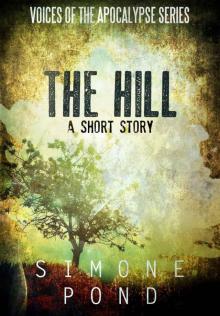 The Hill: A Short Story (Voices of the Apocalypse Book 3)
The Hill: A Short Story (Voices of the Apocalypse Book 3) River of Magic (The Mysterium Chronicles Book 2)
River of Magic (The Mysterium Chronicles Book 2) The New Agenda
The New Agenda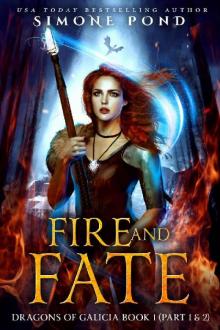 Fire and Fate: Part 1 & 2 (Dragons of Galicia)
Fire and Fate: Part 1 & 2 (Dragons of Galicia)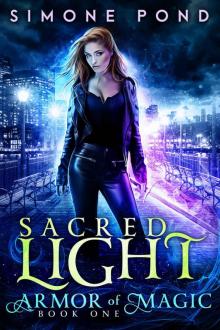 Sacred Light (Armor of Magic Book 1)
Sacred Light (Armor of Magic Book 1) Fire and Blood (Dragons of Galicia Book 3)
Fire and Blood (Dragons of Galicia Book 3)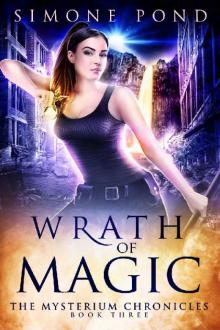 Wrath of Magic (The Mysterium Chronicles Book Book 3)
Wrath of Magic (The Mysterium Chronicles Book Book 3)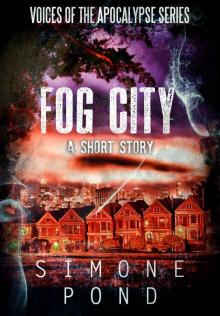 Fog City: A Short Story (Voices of the Apocalypse Book 5)
Fog City: A Short Story (Voices of the Apocalypse Book 5)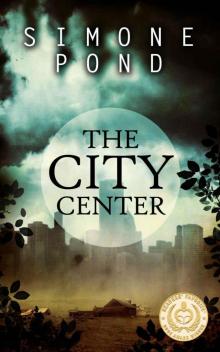 The City Center (The New Agenda Series Book 1)
The City Center (The New Agenda Series Book 1) Edge of Light (Armor of Magic Book 3)
Edge of Light (Armor of Magic Book 3) Exodus of Magic (The Mysterium Chronicles Book 1)
Exodus of Magic (The Mysterium Chronicles Book 1) Hidden Sight (Coastview Prophecies Book 1)
Hidden Sight (Coastview Prophecies Book 1)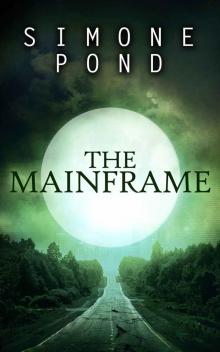 The Mainframe (The New Agenda Series Book 3)
The Mainframe (The New Agenda Series Book 3)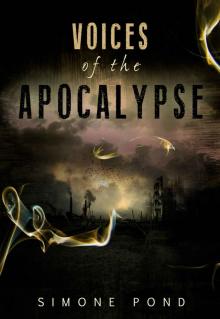 Voices of the Apocalypse: The Collection
Voices of the Apocalypse: The Collection Fire and Chains (Dragons of Galicia Book 2)
Fire and Chains (Dragons of Galicia Book 2) Beyond Sight (Coastview Prophecies Book 2)
Beyond Sight (Coastview Prophecies Book 2)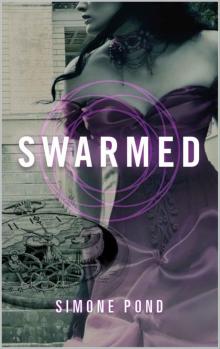 Swarmed
Swarmed